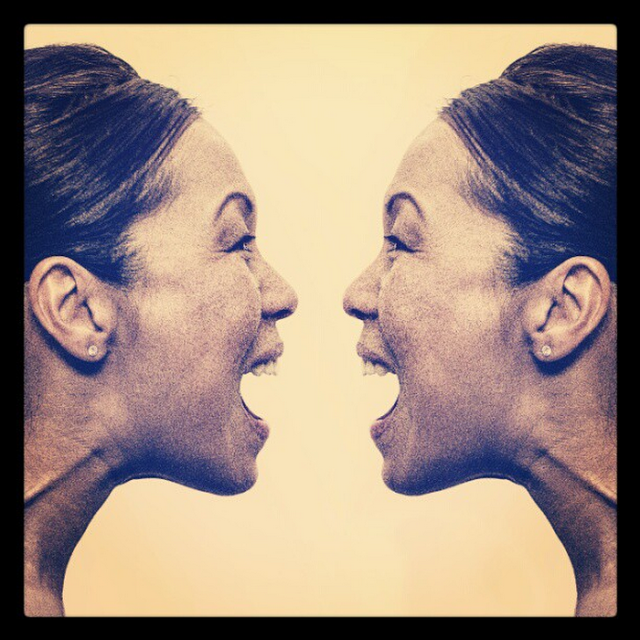“All that a guru can tell you is: ‘My dear Sir, you are quite mistaken about yourself. You are not the person you take yourself to be.” ~ Nisargadatta Maharaj
Perception as Identity
Although we may not always be conscious of it, most of us spend considerable energy cultivating our own personal brand of “self.” We strive to see ourselves and be seen by others in a certain way.
Our sense of identity typically comes from a combination of many different things. I might, for example, think of myself as a coach, meditator, introvert, wife, good listener, etc.
The way others act towards us can help confirm and strengthen our sense of identity, or challenge it.
For instance, if part of our identity is being “a hard worker” and our boss promotes us, we may feel our sense of self has been validated, and we’ll likely experience positive feelings. However, our boss gives us a poor performance review, our sense of self may feel threatened. As a result we may develop hostility toward the other person and experience conflict with them.
The majority of conflicts that occur within workplaces and personal relationships are rooted in identity threats, and they can be extremely painful and destructive.
How much we like, value, and get along with others is often determined by how much they validate our sense of self.
We consider a relationship to be “good,” “positive,”, or “healthy” when it gives us what we seek, and we then consider the other person to be “nice,” “friendly,” “generous,” “caring,” etc. Because of this, we often approach relationships with a great deal of neediness. Like hungry beggars, we seek constant affirmation, acknowledgement, love, respect, and support for who we are.
When we don’t get the support we want, we see ourselves as hurt or diminished in some way.
We may internalize these feelings and suffer from low self-esteem. Or we may turn against the other person, believing they are to blame for not giving us what we needed—no, deserved —in order to feel more secure, more whole.
Rarely do we stop to wonder: how much responsibility do we have for the stability of our own identity? How real can our sense of self actually be, especially when we feel vulnerable?
There is an apple tree outside my window. I’m aware that the tree doesn’t care what I think of it. Nor do my opinions change what it is in any way. I could fling insults at it. I could call it a bug, a flower, a cloud, or a cat. It doesn’t change the reality that the tree is still a tree.
Why isn’t it the same for us?
From the time we are born, other people judge us, both positively and negatively.
They judge us based on what we say or do, we may be told we’re good, smart, pretty, athletic, funny, intelligent, messy, irresponsible, mean, or lazy. As we grow older, we make judgments about ourselves based on how others view and treat us, as well as the things we acquire—roles, titles, possessions, awards, etc.
We quickly become quite attached to these things, often so much so that we start to mistake them for the core of who we are.
For example, if other people think I act compassionately, I believe I am a nice person. If I get a raise at my job, I believe I am a competent person. If I have a big house, then I am a successful person. The problem with this is that all these things are impermanent-–people’s perceptions of us, our roles, titles, jobs, and possessions are always changing.
As a result of identifying with such unstable things our sense of who we are never feels completely safe or stable. One minute our heart may be soaring from receiving high praise, and the next minute a harsh criticism makes us feel worthless. This leads to great deal of hunger and aversion in our relationships. Because our sense of self is so shaky, and therefore dependent on how others perceive us, we put immense energy into receiving positive judgments from others, and avoiding negative ones. Yet the needs we are trying to meet are often based on a false sense of self.
Consciousness as Identity
I invite you to take a few minutes and simply observe you mind. Imagine that you are sitting in an audience watching your thoughts and feelings as if they were actors on a stage. Whatever drama happens, you simply notice it without judgment. In doing this, you may notice something interesting: While your mind may have thoughts and feelings, you are not these thoughts and feelings. You couldn’t be, or else you could not step back and observe them.
You are not your thoughts and feelings. You are the consciousness that observes them.
Like the tree, our consciousness simply is. Its existence is not determined by what happens to us, or other people’s thoughts and reactions towards us. Regardless of our changing thoughts and life circumstances, it remains the same.
When we realize that our identity is not determined by thoughts and judgments, we become less needy and reactive in our relationships.
Our self-worth doesn’t hinge on what another person says or does to us. And because our actions are no longer based on getting positive judgments, or avoiding negative ones, we become more capable of acting in a way that is aligned with our True Self. Being less self-focused, we naturally can be more generous and compassionate towards others. Connecting with our stable True Self makes us more able to handle criticism, rejection, or negative perceptions. While these might cause us painful feelings, by simply watching our feelings and thoughts and not identifying with them, we can acknowledge these feelings and let them go, rather than cling to them and become reactive.
The next time another person does something that seems to threaten you identity, engage in the following process to access your True Self.
Name the threat. Identify the core of what you feel is being endangered by the situation. What part of your identity seems at risk?
Acknowledge the pain of this threat. What emotions do you feel? Anger? Sadness? Loneliness? Whatever you feel is valid—the pain is real.
Assess the reality of the threat. Ask yourself: Does this situation truly determine my self-worth? Does it define or shape who I really am? Why or why not? Personally, I sometimes struggle to answer these questions. To help me, I remind myself with me a quote from A Course in Miracles.
“Nothing real can be threatened. Nothing unreal exists.”
Love elephant and want to go steady?
Sign up for our (curated) daily and weekly newsletters!
Apprentice Editor: Sarvasmarana Ma Nithya/ Editor: Renée Picard
Photo: Jason Bo at Pixoto







Read 0 comments and reply